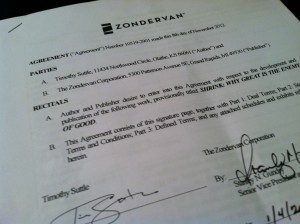“We have all been there, and it feels like the end of the world. It’s like a chickadee being hit by and H-Bomb. Here’s the thing, though. I no longer think of it as block. I think that is looking at the problem from the wrong angle. If your wife locks you out of the house, you don’t have a problem with your door.” –Anne Lamott, Bird by Bird
_________________________________________________________
What do you do when your inner-writer goes on coffee break, you know, for days on end? It’s not a rhetorical question. Seriously, I’m looking for ideas, people… because some days it seems like I just don’t have it.
Anne Lamott says the first thing to remember is acceptance. You can’t force it when it’s not there, you’ll hurt yourself, or others. She writers, “If you accept the reality that you have been given- that you are not in a productive creative period–you free yourself to begin filling up again.” (p.178)
There is a sense in which writer’s block isn’t really block at all. You can’t birth a child before it’s ready to be born. You are earlier on in the process than you want to be, that’s all.
However, there are those times when the deadline is looming and you simply have to get it done. For me, I have to write a short chapter’s worth of long-form essay material almost every week of the year (called a sermon). I don’t have the option of putting off Sunday until next week. Nothing stresses me out more than when I’m up against a deadline and, in the words of Toby Ziegler, there’s no blood going to it.
There’s an interesting article up at LifeHacker listing six ways to beat writer’s block. You can read the article here. It seems pretty smart to me, but I have a few additions and subtractions of my own. First, here’s their list:
- Leave things while you are doing well, even if you have to stop mid-sentence.
- Just write anything to get the words flowing.
- Write about how it feels not to be able to write–it’s like free therapy.
Keep an exciting scene or idea on hand, pivot to this when you are blocked.- Maintain a writing schedule
- Get Verbal and think out loud
I’ve used all of these at one time or another, except the third. I’m not sure I recommend going to the money scene on a day when you are struggling to put pen to paper. Keep plenty of ideas on hand, but do the big scene when you are on the top of your game, not the bottom.
I actually think most, if not all of this list is covered in more detail in Julia Cameron’s great book The Artist’s Way. She recommends “day pages,” the habit of sitting down to write at the same time every day, and generating at least one page by hand–even if you are copying someone else’s writing, even if you just write about having nothing to write about. I love this book, and I have a few additions to the LifeHacker list. Here are some of the tricks I use:
- Think Ahead: Use a portion of your high-creativity season to prepare for times of low-creativity. When the writing juices are really flowing, take some of that time to generate ideas and content for a later date.
- Catalog Ideas: I’m still learning to do this well. When you are required to generate constant material, some sort of rudimentary system is required to organize and catalog your ideas. I use three things constantly. First, the voice memo function on my phone. Second, a journal. Third, digital file folders containing sources, article ideas, blog post ideas, interesting stories, facts, research, quotes, and so on. I often peruse these files when I’m struggle to be creative.
- Get Moving: If I feel blocked up for more than ten minutes, I go for a walk. If I don’t lock in when I return from the walk, I go for a drive and grab a soda from the QuickTrip nearby. If I’ve got the idea, but I’m struggling to articulate, I grab my phone, take a walk, and record a rambling voice memo in which I struggle with the language.
- Work in high energy/activity environments: I think nothing changed my writing life more that a great pair of noise blocking earbuds. Working in an active environment helps to raise my energy level, and often my writing groove comes along with it.
- Talk it through with somebody: Often, when I’m circling a topic and can’t figure out my way in, I make someone sit with me and talk about it. They need to be sharp enough to help you, but can’t be someone who thinks they can do it much better than you can. My poor wife has to do this about five times a month. I have a few folks I can call or grab around the office and dragoon them into a short conversation with me about what I’m working on. It might be the very best way to get on track.
Thoughts?













